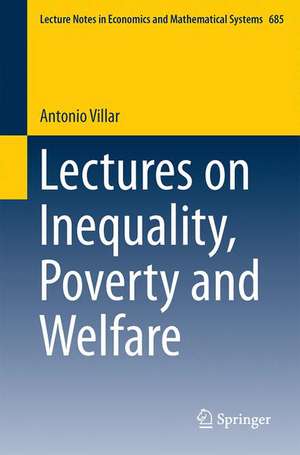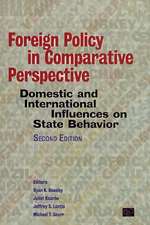Lectures on Inequality, Poverty and Welfare: Lecture Notes in Economics and Mathematical Systems, cartea 685
Autor Antonio Villaren Limba Engleză Paperback – 25 dec 2016
Din seria Lecture Notes in Economics and Mathematical Systems
-
 Preț: 360.02 lei
Preț: 360.02 lei -
 Preț: 383.93 lei
Preț: 383.93 lei - 15%
 Preț: 693.39 lei
Preț: 693.39 lei -
 Preț: 384.09 lei
Preț: 384.09 lei -
 Preț: 380.07 lei
Preț: 380.07 lei -
 Preț: 446.26 lei
Preț: 446.26 lei -
 Preț: 497.37 lei
Preț: 497.37 lei -
 Preț: 380.84 lei
Preț: 380.84 lei -
 Preț: 384.86 lei
Preț: 384.86 lei -
 Preț: 378.34 lei
Preț: 378.34 lei -
 Preț: 399.67 lei
Preț: 399.67 lei - 20%
 Preț: 360.93 lei
Preț: 360.93 lei - 15%
 Preț: 643.16 lei
Preț: 643.16 lei -
 Preț: 379.09 lei
Preț: 379.09 lei -
 Preț: 404.76 lei
Preț: 404.76 lei -
 Preț: 385.62 lei
Preț: 385.62 lei - 15%
 Preț: 644.49 lei
Preț: 644.49 lei -
 Preț: 379.09 lei
Preț: 379.09 lei -
 Preț: 345.50 lei
Preț: 345.50 lei -
 Preț: 425.80 lei
Preț: 425.80 lei -
 Preț: 378.34 lei
Preț: 378.34 lei - 18%
 Preț: 775.65 lei
Preț: 775.65 lei -
 Preț: 392.60 lei
Preț: 392.60 lei -
 Preț: 401.61 lei
Preț: 401.61 lei - 15%
 Preț: 646.43 lei
Preț: 646.43 lei -
 Preț: 382.18 lei
Preț: 382.18 lei -
 Preț: 378.34 lei
Preț: 378.34 lei - 15%
 Preț: 637.59 lei
Preț: 637.59 lei - 15%
 Preț: 647.27 lei
Preț: 647.27 lei -
 Preț: 377.73 lei
Preț: 377.73 lei -
 Preț: 447.84 lei
Preț: 447.84 lei - 15%
 Preț: 644.49 lei
Preț: 644.49 lei -
 Preț: 386.00 lei
Preț: 386.00 lei - 15%
 Preț: 654.43 lei
Preț: 654.43 lei -
 Preț: 415.02 lei
Preț: 415.02 lei -
 Preț: 411.54 lei
Preț: 411.54 lei -
 Preț: 398.92 lei
Preț: 398.92 lei -
 Preț: 398.92 lei
Preț: 398.92 lei -
 Preț: 392.75 lei
Preț: 392.75 lei - 15%
 Preț: 635.47 lei
Preț: 635.47 lei - 20%
 Preț: 653.56 lei
Preț: 653.56 lei -
 Preț: 379.86 lei
Preț: 379.86 lei -
 Preț: 495.46 lei
Preț: 495.46 lei -
 Preț: 447.99 lei
Preț: 447.99 lei -
 Preț: 378.71 lei
Preț: 378.71 lei - 15%
 Preț: 637.13 lei
Preț: 637.13 lei -
 Preț: 385.84 lei
Preț: 385.84 lei -
 Preț: 378.54 lei
Preț: 378.54 lei - 15%
 Preț: 666.55 lei
Preț: 666.55 lei
Preț: 522.10 lei
Preț vechi: 614.24 lei
-15% Nou
Puncte Express: 783
Preț estimativ în valută:
99.91€ • 105.06$ • 82.55£
99.91€ • 105.06$ • 82.55£
Carte tipărită la comandă
Livrare economică 17 aprilie-01 mai
Preluare comenzi: 021 569.72.76
Specificații
ISBN-13: 9783319455617
ISBN-10: 3319455613
Pagini: 232
Ilustrații: XI, 171 p. 11 illus., 9 illus. in color.
Dimensiuni: 155 x 235 x 10 mm
Greutate: 0.27 kg
Ediția:1st ed. 2017
Editura: Springer International Publishing
Colecția Springer
Seria Lecture Notes in Economics and Mathematical Systems
Locul publicării:Cham, Switzerland
ISBN-10: 3319455613
Pagini: 232
Ilustrații: XI, 171 p. 11 illus., 9 illus. in color.
Dimensiuni: 155 x 235 x 10 mm
Greutate: 0.27 kg
Ediția:1st ed. 2017
Editura: Springer International Publishing
Colecția Springer
Seria Lecture Notes in Economics and Mathematical Systems
Locul publicării:Cham, Switzerland
Cuprins
Introduction.- Part i: Inequality.- Inequality indices.- Positive inequality indices.- Normative inequality indices.- Inequality of opportunity.- Inequality and welfare.- Part ii: Poverty.- Poverty measurement.- Multidimensional poverty and welfare.- The evaluation of relative achievements.
Notă biografică
Antonio Villar is Professor of Economics at the Universidad Pablo de Olavide (Seville), where he arrived in 2005 from the University of Alicante. He is also Senior Researcher at the Ivie (Valencian Institute for Economic Research).
He got a Ph.D. at the University of Oxford in 1990, after a B.A. in Economics (University of Valencia, 1978) and a previous Doctorate (University of Alicante, 1983).
He has been Visiting Professor at Stanford University, the European University Institute (Florence, Italy), the Institute for Advanced Studies (Vienna), Senior Associate at St. Antony’s College, University of Oxford, and Visiting Researcher at the University of York, among others. During 2015/2016 he held a Thomas J. Alexander Fellowship at the OECD/EDU in Paris.
In 2010 he got the Andalusian Prize for distinguished research in Social Sciences and Humanities.
Hisresearch activity concentrates on Microeconomic Theory and its applications. In particular: (a) Welfare economics and social choice, including aspects of efficiency with externalities, public goods and non-convexities, distributive problems, inequality and welfare measurement, multidimensional indicators, Human Development and Economics of Education; and (b) General equilibrium, with special interest on the effects of increasing returns to scale in market economies. His latest research deals with the welfare analysis of some economic aspects that involve both private and public decisions, such as health, education and income distribution. A common theme of some of those topics is the design of multidimensional indicators and evaluation formulas capable of dealing with qualitative data. He has published 14 books and some 80 research papers.
He got a Ph.D. at the University of Oxford in 1990, after a B.A. in Economics (University of Valencia, 1978) and a previous Doctorate (University of Alicante, 1983).
He has been Visiting Professor at Stanford University, the European University Institute (Florence, Italy), the Institute for Advanced Studies (Vienna), Senior Associate at St. Antony’s College, University of Oxford, and Visiting Researcher at the University of York, among others. During 2015/2016 he held a Thomas J. Alexander Fellowship at the OECD/EDU in Paris.
In 2010 he got the Andalusian Prize for distinguished research in Social Sciences and Humanities.
Hisresearch activity concentrates on Microeconomic Theory and its applications. In particular: (a) Welfare economics and social choice, including aspects of efficiency with externalities, public goods and non-convexities, distributive problems, inequality and welfare measurement, multidimensional indicators, Human Development and Economics of Education; and (b) General equilibrium, with special interest on the effects of increasing returns to scale in market economies. His latest research deals with the welfare analysis of some economic aspects that involve both private and public decisions, such as health, education and income distribution. A common theme of some of those topics is the design of multidimensional indicators and evaluation formulas capable of dealing with qualitative data. He has published 14 books and some 80 research papers.
Textul de pe ultima copertă
These lectures aim to help readers understand the logics and nature of the main indicators of inequality and poverty, with special attention to their social welfare underpinnings. The key approach consists in linking inequality and poverty measurement with welfare evaluation. As concern for inequality and poverty stems from ethical considerations, the measurement of those aspects necessarily involves some value judgments. Those value judgments can be linked, directly or indirectly, to welfare assessments on the distribution of personal and social opportunities. Inequality and poverty are thus considered to be partial aspects of the welfare evaluation of the opportunities in a given society. The volume includes two applications that illustrate how the models can be implemented. They refer to inequality of opportunity and poverty in education, using PISA data.
Caracteristici
Helps readers understand the logics of the main indicators of inequality and poverty Introduces new ideas regarding income distribution as part of welfare evaluation Includes two applications to illustrate how to implement the models


















